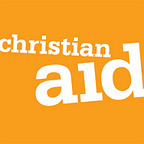Programme in pictures: the hidden stories behind the photographs
Picture Power Nigeria, part of our UK Aid Match programme
‘It feels good to tell the story of my community. We need to show what we have done, and what still needs to be done.’
John Jerome, Picture Power participant and community health volunteer
John is one of 10 community participants who took part in a recent Picture Power project in Nigeria - a methodology developed by Christian Aid to train participants in basic photography, so they can tell their own stories and share their experiences through images.
We took Picture Power to Nigeria in order to learn more about the successes and challenges of the UK Aid Match programme to reduce mortality in children under 5, in Benue State.
These captioned images were then shared with the wider community through an exhibition, which initiated further debates.
Here are some the images taken by the participants highlighting some of the impacts of the project, and the factors that prevent children under five from being healthy.
‘ This is a volunteer treating a child using a malaria testing kit, it shows an intervention from the project which provides basic healthcare for children under five.
Before the project, we had to take children to hospital and travel far distances. Sometimes people didn’t have the money to go there, but today the project has trained a volunteer in the community, so people no longer need to pay or go far. Now, when there’s an emergency they rush to the health volunteer for treatment’.
John Jerome, participant and community health volunteer
Pauline Ola
Pauline received training and is now a health volunteer who provides basic healthcare for children under five. As part of the Picture Power project, her photo shows the positive impact of the project.
‘These children were brought to me for treatment. After treating them, they recovered, and the mothers said that I did a good job for them. Since the project came to the community they are not spending so much money and children are healthier. Before the project children were dying. Two siblings of two children in this photo died before the project.’
Pauline Ola, Picture Power participant
Steven Adah
Steven (left) and Peter (right) are both community advocates who support and oversee the work of the community health volunteers. They both took part in Picture Power.
Steven’s photo below shows one of the challenges facing his community.
‘A woman processes palm oil on the banks of River Ogbadibo, the sole source of water in Akpuneje Community. Almost every adult woman in Akpuneje community processes palm oil for income and use the river for this process.
‘Members of the community also bathe, wash clothes and fish in the river. Nomadic cattle-rearers also water their cattle here and walk through it in their search for cattle feed.
‘The river Ogbadibo is a major cause of diarrhoea and typhoid in the Akpuneje community.’
Gabriel Adah
Gabriel is a trained volunteer who provides basic healthcare for children under five and took part in the Picture Power project. He highlights recent violence in Benue State as a main concern.
‘Fulani herdsmen invaded the community and killed and injured many people. This has made people afraid to go to the farm and has also affected their source of income.
‘The injured had to go to a hospital in town because they needed surgery to remove the bullets they got during the attack. They went to a traditional healer first because there wasn’t any other way to treat people but when it became hard to treat, they went to the nearest town for treatment.’
Gabriel Adah
Peter Agbo
Peter through his photos shows the very real challenges his community, like others, have accessing healthcare during the rainy season. He also reveals the positive impact it has on children.
‘The bridge is very important to us. It is damaged. After we find it damaged like this, we try and pass it on either side. So now, we don’t know what we can do. At the same time the road leading to the community is bad.
‘In the rainy season sometimes you can’t pass on this bridge, because there is too much water. If you are sick [and the community health volunteer is unable to treat the symptoms] you are carried on someone’s back swimming through the water to the hospital. With a small child they also put it on their back and swim. The lack of access is a big problem.’
Peter Agbo
‘These children were playing, and I came to them, and asked: “who among you is sick?” They replied none of us is sick. I told them that they should go and play.
‘It makes me feel happy. All of the children are in the school because they are treated.’
Peter Agbo
How the project is changing lives
By 2019, this project aims to have reached nearly 200,000 children under five. So far, we have reached 107,021 children — 54% of the target for the project (as of March 2018).
The community photographers continue to capture through pictures the changes and challenges that their communities face, feeding this back to ensure that the project best meets their needs.
